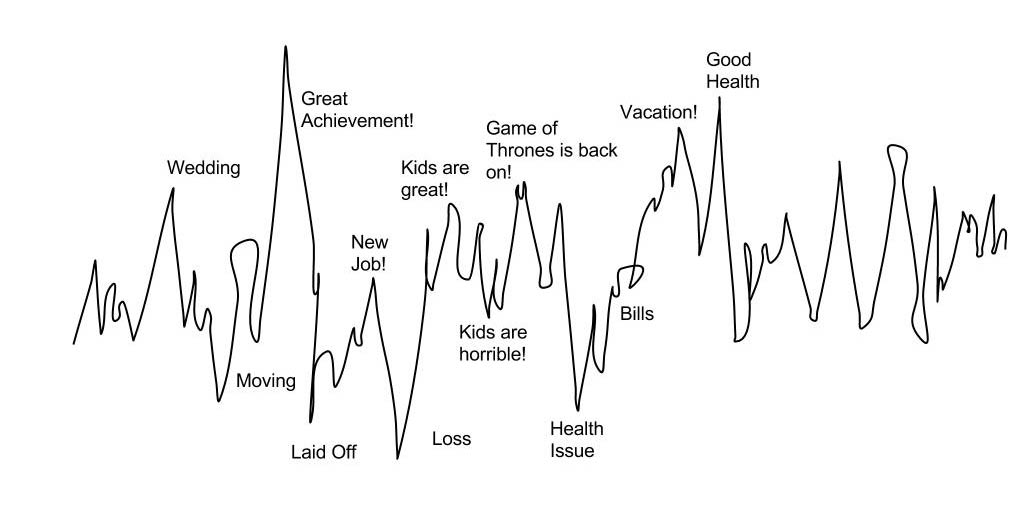The Problem with “Happy”
I’ll be happy when I’m out of school.
I’ll be happy when this project is over.
I’ll be happy when I have more money.
I’ll be happy when I’m in a relationship.
I’ll be happy when I’m engaged.
I’ll be happy when I’m married.
I’ll be happy when I’m out of this relationship.
I’ll be happy when I get this job.
I’ll be happy when I get promoted.
I’ll be happy when we have kids.
I’ll be happy when the kids are grown.
I’ll be happy when it’s summer.
I’ll be happy when it’s the holidays.
I’ll be happy when the holidays are over.
I’ll be happy when….
Why do we always set ourselves up to have to wait to “be happy” and what does “being happy” actually mean?
Yes, things will be “easier financially” when you get that job, but that’s not what makes you “happy”.
Yes, things might seem “more stable and supported” when you feel that you are in a committed relationship, but that’s not what makes you “happy”.
Yes, things will be “a little less stressful” after this project is completed, but that’s not what makes you “happy”.
We put our self in a tough spot when we are convinced that a) we have to wait for happiness b) our happiness can only be derived from external sources/events, and c) happiness is a sustained level of existence that we just coast on for the next 50 years. We do ourselves, and others, a disservice when we fall for the distorted expectation that our life is supposed to look like this:

- Feeling controlled by your emotions
- Unstable or “drama”-filled relationships
- Anger
- Hurt
- Difficulty building trusting, healthy relationships
- Understanding/accepting your own experience
- Maintaining a positive outlook
Then DBT might help you manage and understand your own emotions, while building healthier relationships with the people close to you.
If you have questions about DBT, or want to explore DBT skills, reach out to Midwest Counseling & Diagnostic Center, an outpatient group mental health practice in Chicago. We are highly trained, compassionate therapists who are dedicated to providing the most current research-backed techniques and treatment—including DBT.

Are you defining happiness to mean the absence of any stress or negative emotion? But, we need our negative emotions and part of ongoing development in life will necessitate some struggle. So that can’t be it.
Are you defining happiness to mean achievement and accomplishment? But, if we can always do more, improve, learn, and achieve something else then we will always be waiting to attain that happiness. So that can’t be it.
What if you have no stress in your personal life, everything is amazing, and you’ve accomplished so much, but work is blowing up? Where is your happiness in that situation? Do you have to wait for the planets in all areas of your life to align perfectly and then you’ll be happy? That can’t be it.
What does “happy” mean to you?
I would suggest to you that happiness is not the absence of negative emotion or even a state that sustains itself forever, rather, happiness comes from our ability to connect to our values and things that we find meaningful as we move through life. We don’t have to wait for happiness, we don’t have to sit idly by hoping that something happens to be happy, we can empower ourselves to actively seek opportunity to connect on a daily basis with our own values despite stressors we may be experiencing. That’s not to say some times in our life are more/less stressful than others, and that relief of stress (financially, time-wise, emotionally, etc.) can make it more possible to connect to our values, but that relief of stress itself is not happiness.
What does that image of our life-track look like? If we want to relate it to something in our daily life, what about the stock market?





What about comparing our own stock market to someone else’s?

Happiness is not the absence of struggle, it is your connection to your values and the things/concepts/actions that are meaningful to you.
So let’s talk about values. How do we know what is important to us. Well, I suggest checking out some Values Assessments that may be helpful:
https://www.valuescentre.com/our-products/products-individuals/personal-values-assessment-pva
http://www.strengthsfinder.com/home.aspx
Another good exercise is to sit down and write about 5 people that you have/do admire a great deal. Write out some descriptors or adjectives of these people, their personality, how they are. What was it about these people that really drew you in, and that you respect/value/admire in them? These are characteristics that can also reflect what is important to you and some of your values. When you are able to clarify what some of your values/priorities are, ask yourself if/how you are able to connect to these on a regular basis and what you can do to increase that contact.

your healing journey today.
